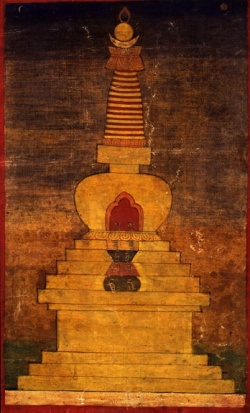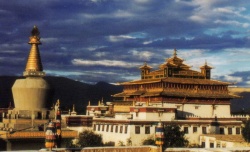Difference between revisions of "Jangchub Sengge"
(Created page with "thumb|250px| <poem> The thirteenth abbot of Katok Monastery, Jangchub Sengge (kaH thog khri rabs 13 byang chub seng+ge) was born in 137...") |
|||
| Line 1: | Line 1: | ||
[[File:953_stupa.jpg|thumb|250px|]] | [[File:953_stupa.jpg|thumb|250px|]] | ||
| + | |||
| + | |||
| + | |||
| + | |||
| + | |||
| + | |||
| + | |||
| + | |||
<poem> | <poem> | ||
The [[thirteenth abbot of Katok Monastery]], [[Jangchub Sengge]] ([[kaH thog khri rabs 13 byang chub seng+ge]]) was born in 1377, the [[fire-snake]] year of the sixth {{Wiki|sexagenary cycle}}. An alternate year given for his [[birth]] is 1372. The names of his [[parents]] or [[birth]] place are not known. | The [[thirteenth abbot of Katok Monastery]], [[Jangchub Sengge]] ([[kaH thog khri rabs 13 byang chub seng+ge]]) was born in 1377, the [[fire-snake]] year of the sixth {{Wiki|sexagenary cycle}}. An alternate year given for his [[birth]] is 1372. The names of his [[parents]] or [[birth]] place are not known. | ||
| Line 5: | Line 13: | ||
[[Jangchub Sengge]] studied [[sūtra]] and [[tantra]], particularly the generation and [[completion stage]] practices ([[bskyed rdzogs]]) of various [[tantric]] systems followed at [[Katok]], under [[Lodro Sengge]] ([[blo gros seng ge]] 1371-1430), and [[Jangchub Lodro]] ([[sum ston byang chub blo gros]], d.u.), the eleventh and twelfth [[abbots]] of the [[monastery]], respectively. He later specialized in the [[Guhyagarbha Tantra]], the the main [[tantra]] of [[Mahāyoga]] class of [[tantra]] according to the [[Nyingma tradition]], and [[Dzogchen]] ([[rdzogs chen]]). | [[Jangchub Sengge]] studied [[sūtra]] and [[tantra]], particularly the generation and [[completion stage]] practices ([[bskyed rdzogs]]) of various [[tantric]] systems followed at [[Katok]], under [[Lodro Sengge]] ([[blo gros seng ge]] 1371-1430), and [[Jangchub Lodro]] ([[sum ston byang chub blo gros]], d.u.), the eleventh and twelfth [[abbots]] of the [[monastery]], respectively. He later specialized in the [[Guhyagarbha Tantra]], the the main [[tantra]] of [[Mahāyoga]] class of [[tantra]] according to the [[Nyingma tradition]], and [[Dzogchen]] ([[rdzogs chen]]). | ||
| − | [[Jangchub Sengge]] succeeded his [[teacher]] [[Jangchub Lodro]] as [[abbot of Katok]], although the year of his enthronement is not known. During his short tenure he taught extensively, mainly following the texts from [[Sūtra]] and [[Guhyagarbha-tantra]]. When he noticed that a large number of [[disciples]] had reached advanced stages of study and practice, he instructed most of them to go to [[Zurwukpa Lung]] ([[zur 'ug pa lung]]) and [[Sang-ngag Ling]] ([[gsangs ngag gling]]). Many of his students were also based at the [[Durtro Monastery]] ([[dur khrod dgon]]) in the Drichu valley ('bri chu). | + | [[Jangchub Sengge]] succeeded his [[teacher]] [[Jangchub Lodro]] as [[abbot of Katok]], although the year of his enthronement is not known. During his short tenure he [[taught]] extensively, mainly following the texts from [[Sūtra]] and [[Guhyagarbha-tantra]]. When he noticed that a large number of [[disciples]] had reached advanced stages of study and practice, he instructed most of them to go to [[Zurwukpa Lung]] ([[zur 'ug pa lung]]) and [[Sang-ngag Ling]] ([[gsangs ngag gling]]). Many of his students were also based at the [[Durtro Monastery]] ([[dur khrod dgon]]) in the [[Drichu]] valley ('bri chu). |
| − | [[Jangchub Sengge]] was said to have strict control over the protector [[deity]] [[Damchen Dorje Lekpa]] ([[dam can rdo rje legs pa]]) whom he employed like a servant for [[religious]] [[activities]]. It was said that [[Damchen Dorje Lekpa]] brought a life-size statue of [[Śākyamuni Buddha]] from the [[Odantapuri Temple]] in [[India]] to [[Katok]] at his instruction; it was installed as the main [[object]] of [[faith]] at [[Lhachen Khang]] ([[lha chen khang]]), a main [[temple]] there. [[Damchen]] also is said to have [[offered]] a life-size statue of [[Padmasambhava]] at [[Gar]] ([[mgar]]). [[Jangchub Sengge]] further is said to have employed the [[deity]] as messenger allowing him to maintain [[contact]] with his [[disciples]] in the [[Drichu]] region, including at [[Durtro Monastery]]. | + | [[Jangchub Sengge]] was said to have strict control over the [[protector]] [[deity]] [[Damchen Dorje Lekpa]] ([[dam can rdo rje legs pa]]) whom he employed like a servant for [[religious]] [[activities]]. It was said that [[Damchen Dorje Lekpa]] brought a life-size statue of [[Śākyamuni Buddha]] from the [[Odantapuri Temple]] in [[India]] to [[Katok]] at his instruction; it was installed as the main [[object]] of [[faith]] at [[Lhachen Khang]] ([[lha chen khang]]), a main [[temple]] there. [[Damchen]] also is said to have [[offered]] a life-size statue of [[Padmasambhava]] at [[Gar]] ([[mgar]]). [[Jangchub Sengge]] further is said to have employed the [[deity]] as messenger allowing him to maintain [[contact]] with his [[disciples]] in the [[Drichu]] region, [[including]] at [[Durtro Monastery]]. |
[[Jangchub Sengge]] passed into [[nirvana]] in 1439, the year of [[earth-sheep]] in the seventh {{Wiki|sexagenary cycle}}, at the age of about sixty-three. [[Drubchok Jangchub Gyeltsen]] ([[grub mchog byang chub rgyal mtshan]], d.u.) succeeded him as the [[fourteenth abbot of Katok]]. | [[Jangchub Sengge]] passed into [[nirvana]] in 1439, the year of [[earth-sheep]] in the seventh {{Wiki|sexagenary cycle}}, at the age of about sixty-three. [[Drubchok Jangchub Gyeltsen]] ([[grub mchog byang chub rgyal mtshan]], d.u.) succeeded him as the [[fourteenth abbot of Katok]]. | ||
Latest revision as of 16:30, 1 April 2024
The thirteenth abbot of Katok Monastery, Jangchub Sengge (kaH thog khri rabs 13 byang chub seng+ge) was born in 1377, the fire-snake year of the sixth sexagenary cycle. An alternate year given for his birth is 1372. The names of his parents or birth place are not known.
Jangchub Sengge studied sūtra and tantra, particularly the generation and completion stage practices (bskyed rdzogs) of various tantric systems followed at Katok, under Lodro Sengge (blo gros seng ge 1371-1430), and Jangchub Lodro (sum ston byang chub blo gros, d.u.), the eleventh and twelfth abbots of the monastery, respectively. He later specialized in the Guhyagarbha Tantra, the the main tantra of Mahāyoga class of tantra according to the Nyingma tradition, and Dzogchen (rdzogs chen).
Jangchub Sengge succeeded his teacher Jangchub Lodro as abbot of Katok, although the year of his enthronement is not known. During his short tenure he taught extensively, mainly following the texts from Sūtra and Guhyagarbha-tantra. When he noticed that a large number of disciples had reached advanced stages of study and practice, he instructed most of them to go to Zurwukpa Lung (zur 'ug pa lung) and Sang-ngag Ling (gsangs ngag gling). Many of his students were also based at the Durtro Monastery (dur khrod dgon) in the Drichu valley ('bri chu).
Jangchub Sengge was said to have strict control over the protector deity Damchen Dorje Lekpa (dam can rdo rje legs pa) whom he employed like a servant for religious activities. It was said that Damchen Dorje Lekpa brought a life-size statue of Śākyamuni Buddha from the Odantapuri Temple in India to Katok at his instruction; it was installed as the main object of faith at Lhachen Khang (lha chen khang), a main temple there. Damchen also is said to have offered a life-size statue of Padmasambhava at Gar (mgar). Jangchub Sengge further is said to have employed the deity as messenger allowing him to maintain contact with his disciples in the Drichu region, including at Durtro Monastery.
Jangchub Sengge passed into nirvana in 1439, the year of earth-sheep in the seventh sexagenary cycle, at the age of about sixty-three. Drubchok Jangchub Gyeltsen (grub mchog byang chub rgyal mtshan, d.u.) succeeded him as the fourteenth abbot of Katok.

